Orange and pink fireworks colored the skies over south London on Monday, as members of the local South Asian community celebrated Diwali.
This year, the holiday aligned with Rishi Sunak, 42, becoming Britain’s first prime minister of Indian descent, as Hindus like him celebrated the festival of lights.
Sunak’s rise to power has split opinion among South Asians in the UK. Some believe his historic appointment is a moment of pride and sign of social progress in Britain, while others point to his immense wealth, privately educated background and adoption of hard right-wing policies.
Evidence of this wide range of views was clear when CNN spoke to South Asians in the London neighborhood of Tooting – home to a bustling migrant community within the British capital.
Flamboyant fabric shops, places of worship and food vendors offering syrupy Indian desserts alongside fresh fruits and vegetables line the streets, with family-run convenience stores dotting nearly every corner.
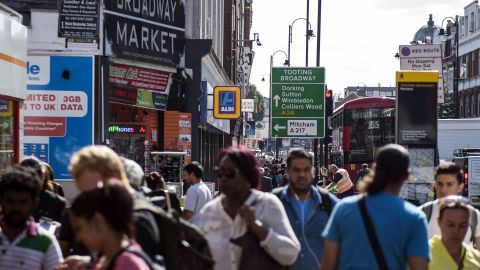
The London suburb is steeped in the richly diverse heritage of its residents, where people of color comprise over half of the population, according to the 2011 UK census.
The same data found that nearly 30% of people in Tooting identify as “Asian” or “Asian British,” and after English, Urdu and Gujarati are among the most common languages spoken.
“I think it’s a good thing and especially auspicious on the day of Diwali, for him to be appointed,” Raj Singh, a Punjabi-Sikh member of the Khalsa Centre, a local Sikh temple, told CNN.
“It is a sign of progress, but only at the top. Rishi Sunak comes from a very privileged background,” the 58-year-old solicitor said, his glasses tucked behind his bright orange turban.
Singh said he believed Sunak’s ascent is a sign that only South Asian politicians with immense social and economic privilege can “break the glass ceiling.”
Earlier this year, Sunak and his wife Akshata Murty, the daughter of an Indian billionaire, appeared on the Sunday Times Rich List of the UK’s 250 wealthiest people. The newspaper estimated their joint net worth at £730 million ($826 million).
‘I never thought this day would come’
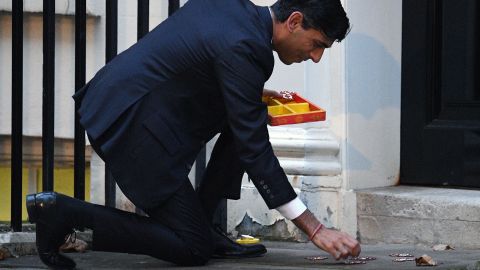
Sunak received a flurry of congratulations from other politicians of South Asian heritage, including former Conservative cabinet minister Sajid Javid and London Mayor Sadiq Khan, who is in the opposition Labour Party. Indian Prime Minister Narendra Modi also sent Sunak “special Diwali wishes,” calling him a “bridge” between the two countries.
Outside the capital, Sanjay Chandarana, who heads a Hindu temple in Southampton, southern England, co-founded by Sunak’s grandparents in 1971, told CNN that Sunak’s elevation was “a Barack Obama moment” for the UK, in a nod to America’s first Black president.
“I think it’s something of importance to the South Asian community … seeing that he is the first South Asian prime minister of the UK. It’s something that I think all South Asians should be proud of,” Irtaza Nasir, a 24-year-old restaurant director in Tooting, said. “I never thought this day would come.”
Anil Shah, a garrulous 75-year-old Hindu Gujarati shopkeeper, said Sunak’s leadership “proves that we have Indians who are clever enough to do the job.”
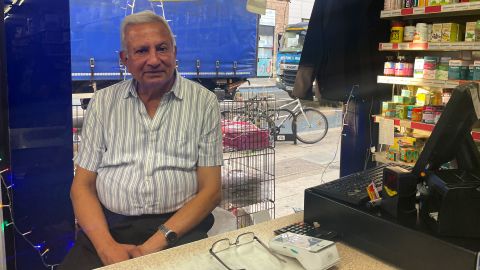
However, Nilufar Ahmed, a psychologist at the University of Bristol in western England, said Sunak’s leadership is “nuanced and complex,” and cautioned the limits of racial representation at the highest rungs of British politics.
“I think that there was something quite lovely about his appointment coming alongside Diwali. I think that was really meaningful for many South Asians to have that,” she said.
“But I also think that it’s too simplistic to see Rishi Sunak as symbolic of a South Asian community in the UK. This is a man that has had lots of privilege and so he isn’t as representative as some of the discourse around representation is presenting him to be.”
Ahmed said she remains cynical about comparisons between Sunak and Obama’s premiership, citing the absence of a mandate from the general population in Britain.
Sunak was appointed prime minister, replacing Liz Truss, after his lone remaining rival Penny Mordaunt dropped out of the Conservative Party leadership contest. He is the third British prime minister in seven weeks, with his premiership sparking calls from across the political spectrum for a general election.
“Rishi Sunak was not even elected by his own party, let alone by the UK population. And so there will be a resistance in the population against Sunak being appointed. He will not be seen as somebody who perhaps represents the membership or the voters of the Conservative Party,” Ahmed commented.
She added that his premiership could “play out in quite worrying ways,” citing a viral video in which a Conservative party member launched racist criticism against Sunak and told LBC Radio that he “doesn’t love England” and “isn’t even British in most people’s opinion.”
Sunak was born in the coastal city of Southampton and is a British citizen.
For Lubeena Yar, a 56-year-old entrepreneur based in Tooting, Sunak’s appointment “was circumstantial.”
“Conservatives are Conservatives. I don’t think it really matters what color their skin is,” the 56-year-old reflected as she sat on a plush pink chair inside her Pakistani clothes store.
Yar said she did not align with Sunak’s Conservative Party values, but added that she identified with the sacrifices his parents made in migrating to the UK from East Africa in the 1960s.
She recalled that when her parents first came from Pakistan to the UK in the same period, her father was turned away from homeowning opportunities because racist neighbors would say they did not want a person of color living on their street.
“I’ve grown up in that era. And, you know, I remember what my life was or what my parents had to sacrifice so we could get a good education, get our degrees and do what we wanted to. Our parents weren’t from that privileged background, but they made it for us.”
‘I don’t see this as racial progress’
Sunak has inherited myriad challenges as the UK’s new leader, namely the task of steering the country out of a grueling cost-of-living crisis and calming financial markets in the wake of Truss’ short and chaotic premiership.
However, Sunak is also partially responsible for the economic turmoil suffocating the UK.
While serving as the UK’s former finance minister under Boris Johnson’s government, he installed measures worth £400 billion ($452 billion) aimed at strengthening the economy, including a generous furlough scheme, business loans and concessions on eating in restaurants. But that stimulus came at a sizeable cost and left the government struggling to find savings.
He has pledged to bring “stability and unity” to the Conservatives by appealing to multiple factions of the party, which has seen deepening divisions since the 2016 Brexit vote.
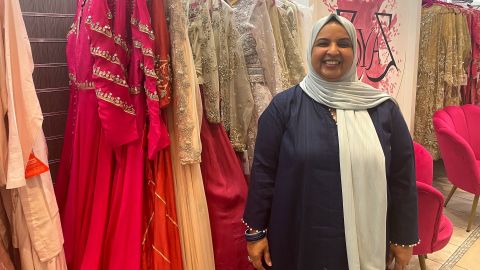
He has historically voted to support stronger enforcement of immigration and asylum rules and opposed measures to prevent climate change and promote equality and human rights. Like his predecessor, Sunak promised a tough approach to illegal immigration and vowed to expand the government’s controversial Rwanda immigration policy.
Further north, in the Scottish city of Glasgow, Fariya Sharif, said she failed to see Sunak’s leadership as a sign of equality.
“Rishi Sunak’s appointment makes me feel deflated and devastated at the chaos of the Tories continuing to badly rule our country, especially another PM that wasn’t elected by everyday people,” the 30-year-old Muslim Pakistani chef said by email.
“I don’t see this as racial progress. I see this as tokenism from the Tories trying to push their agenda on wealthier immigrant communities … it encourages an environment where brown people are only accepted if they follow the same harsh rules on immigration and economics.”
‘Really mixed views’
Sunak’s premiership has sparked a debate among many British Asians that lies at the intersection of race, class and politics.
The new prime minister has entered Downing Street as one of its richest ever occupants, yet he has the task of leading a country where marginalized communities are falling deeper into poverty in the wake of the coronavirus pandemic.
During his time as chancellor of the exchequer, Sunak was criticized for proposing a negligible 1% pay rise to staff for Britain’s National Health Service, despite the institution crumbling under government cuts and staff shortages.
Rina Patel, a Hindu Gujarati doctor who works at St. Helier Hospital in south London, said she has “really mixed views” about Sunak’s premiership.
“In terms of representing people, I don’t feel that he can represent the poorest people in our society. And as a doctor in the NHS, I see some of the poorest people in our society that are struggling,” the 43-year-old said against the backdrop of a local jeweler.
“In terms of the fact that he is intelligent, has a finance background, I think he will do better than what’s gone before, but that’s no compliment,” Patel added. “I don’t think he represents me.”
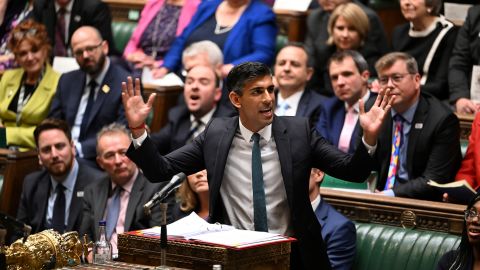
“What I see in Rishi Sunak’s, first and foremost … is an incredibly privileged person with enormous wealth and with access to education and resources that the majority of South Asians in the UK do not have. And so, I have far more in common with working-class White politicians than I do with Rishi Sunak,” Ahmed mused.
Sunak may be the first British prime minister with Indian heritage, but his race alone does not qualify him to represent the diverse and nuanced views of the 4.2 million people with South Asian heritage who live in Britain today.
“Seeing someone brown becoming prime minister is something to be proud of, and yet it is also possible to vehemently disagree with the politics or the individual,” Jasvir Singh, a barrister and co-founder of South Asian Heritage Month, wrote by email.
“Politics is much, much more than just about color and race.”
Source: CNN


